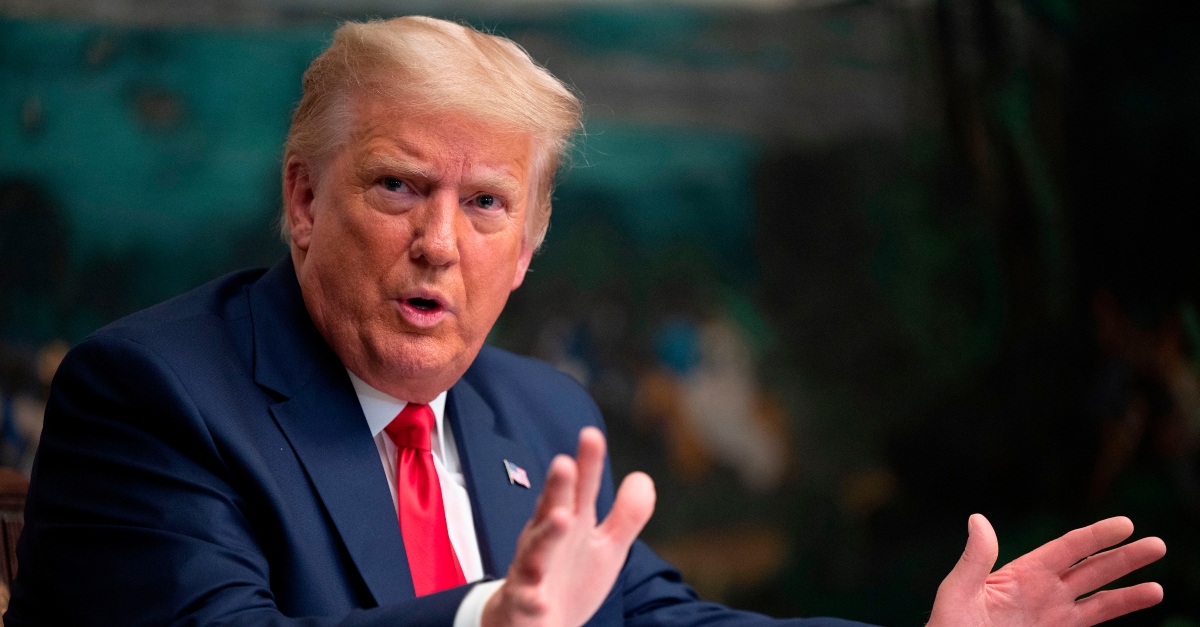
Donald Trump’s attorneys asked a federal appeals court on Tuesday to block the National Archives and Records Administration (NARA) from handing congressional investigators hundreds of pages of White House documents from his administration. Trump contends that complying with the subpoena would “have enormous consequences, forever changing the dynamics between the political branches” and inevitably provide Congress with a “new weapon to perpetually harass its political rival.”
In a 68-page brief filed in the U.S. Court of Appeals for the District of Columbia Circuit, Trump’s attorney Jesse Binnall echoed a federal judge’s language used to describe the breadth of the subpoena from the House Select Committee Investigating the Jan. 6 Attack on the U.S. Capitol. The attorney claimed that the “unbelievably broad” request for documents would give the legislature “almost limitless power” to review sensitive executive branch records “on any matter, at any time, for any reason.”
“This unprecedented claim lacks a limiting principle, is not consistent with our constitutional separation of powers, and should be rejected,” wrote Binnall, who represented Trump in a conspiracy theory-peddling lawsuit that a judge rejected in Nevada.
The Jan. 6 Committee issued subpoenas for a wide array of records, including Trump’s conversations with some 40 people dating back to April 2020 and polling data information to help the committee pin down when he knew that he was going to lose the 2020 election. The committee also sought 46 pages of records from the files of former chief of staff Mark Meadows, ex-senior adviser Stephen Miller, and ex-deputy counsel Patrick Philbin from Archivist David Ferriero, one of the defendants in Trump’s lawsuit.
The brief also argued that allowing a sitting president to unilaterally “extinguish” the executive privilege of a living former president violates the U.S. Constitution and established laws and precedent. Trump had previously asserted the novel claim of post-presidency executive privilege over the records the Jan. 6 Committee sought from NARA.
“[U]nder our Constitution and laws, no individual, including the sitting President, has the unilateral power to extinguish the executive privilege rights of living, former Presidents. Indeed, it is well settled that executive privilege survives a President’s term of office,” Binnall wrote. “At minimum, a dispute concerning the production of records subject to executive privilege must be resolved through the applicable constitutional and statutory framework, including a thorough examination of the documents at issue through the standard judicial process for privilege claims.”
U.S. District Court Judge Tanya Chutkan earlier this month ruled that Trump cannot “override the express will” of sitting U.S. President Joe Biden based on the notion that “his executive power exists in perpetuity.”
“Presidents are not kings, and Plaintiff is not President,” Chutkan wrote. “He retains the right to assert that his records are privileged, but the incumbent President ‘is not constitutionally obliged to honor’ that assertion.”
The Biden administration in October said it would not assert executive privilege for the NARA documents requested, saying the president “determined that an assertion of executive privilege is not in the best interests of the United States, and therefore is not justified as to any of the Documents.”
Two days after Chutkan’s ruling, on the eve of the deadline for the documents to be turned over, a three-judge panel on the D.C. Circuit Court granted Trump’s “emergency” request for an administrative injunction to temporarily block her order. In a brief order, the three-judge panel made sure to note that the administrative injunction was not a ruling on the merits of Trump’s claim.
“The purpose of this administrative injunction is to protect the court’s jurisdiction to address appellant’s claims of executive privilege and should not be construed in any way as a ruling on the merits,” the panel wrote.
The panel, which consists of two Barack Obama appointees—Patricia A. Millett and Robert L. Wilkins—and one Joe Biden appointee, Ketanji Brown Jackson, also approved an expedited briefing request and scheduled a hearing for Nov. 30.
According to Binnall, allowing Chutkan’s order to stand would give Congress a “rubber stamp” to upend separation of powers between the executive and legislative branches.
“A decision upholding the Committees’ request to NARA would have enormous consequences, forever changing the dynamics between the political branches. It is naïve to assume that the fallout will be limited to President Trump or the events of January 6, 2021. Every Congress will point to some unprecedented thing about ‘this President’ to justify a request for his presidential records,” Binnall wrote.
“The district court held that ‘Presidents are not kings.’ True, but in that same vein, Congress is not Parliament—a legislative body with supreme and unchecked constitutional power over the operations of government,” he added.
Read the full brief below.
Marissa Sarnoff contributed to this report
[image via ANDREW CABALLERO-REYNOLDS_AFP via Getty Images]